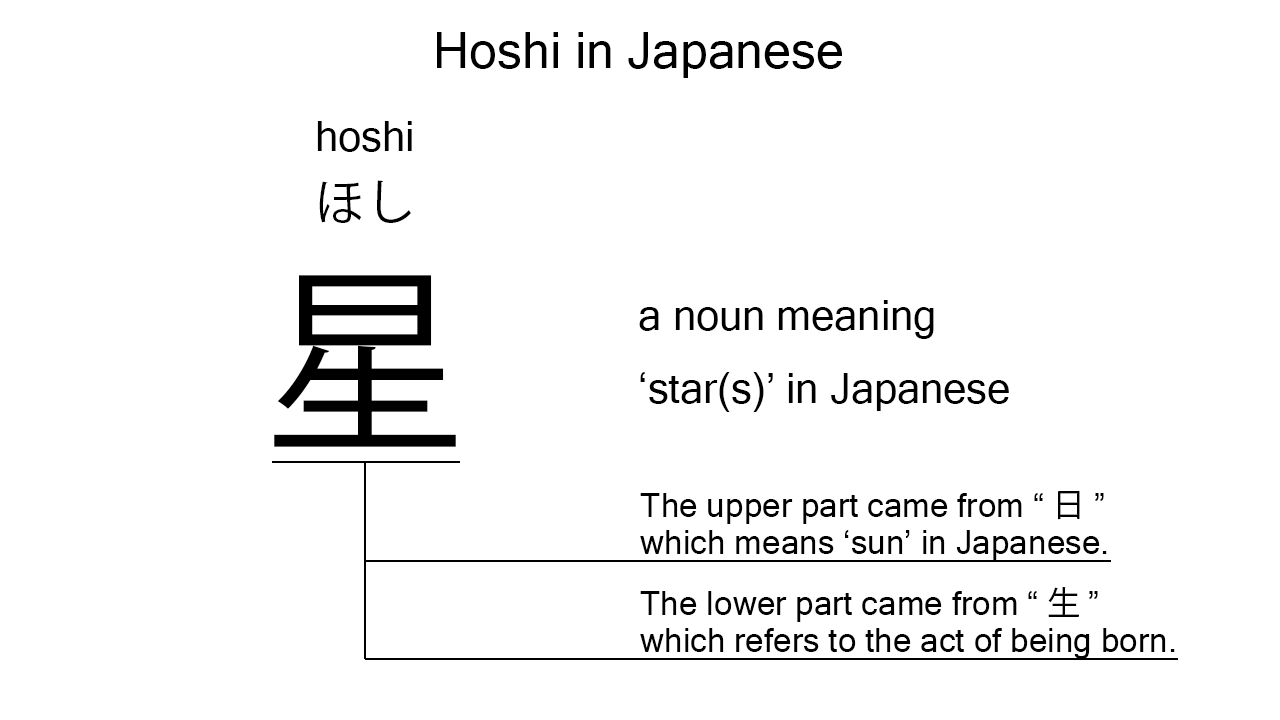What does “hoshi” mean in Japanese?
Native speakers say “hoshi” normally to mean ‘star’ in Japanese. Perhaps, some Japanese learners know this word as it is sometimes used in Japanese movies, songs, novels, manga, anime, and the like. In this blog post, however, I will explain this word in detail based on its kanji character. And also, I will explain how to use it through example sentences. My explanations would help Japanese learners understand “hoshi” more clearly. Then, let’s get started!
Contents
Definition and meanings of “hoshi”
Let me start with the definition and meanings of “hoshi”.
- hoshi – 星 (ほし) : a noun meaning ‘star’ in Japanese. Depending on the context and situation, this can also mean ‘planet’. This can also work as plural. Learn more about Japanese plural.
Native speakers use this noun to refer to ball-shaped objects floating in the space. In addition, they sometimes use this as a metaphor for people outstanding in particular fields.
The definition and meanings are simple and clear, I think. To understand this noun more clearly, however, let me explain its kanji character in detail.
What does “hoshi” literally mean in Japanese?
The kanji character of “hoshi” consists of the following two parts:
- 日 : a kanji character widely used to mean ‘sun’, ‘sunlight’, or ‘day’ in Japanese.
- 生 : a kanji character used to refer to the act of being born.
These two parts tell us that “hoshi” literally means ‘sun born’ in Japanese. This literal interpretation is not in line with the actual meanings, but still understandable, I think. The sun was born in more or less the same way as other stars; the births of stars were highly related to those of planets. So, the literal kanji concept still has the relation with the actual meanings.

When we meet new kanji characters, we should check their parts in detail to understand their meanings clearly and deeply. In many cases, kanji parts tell us a lot about the meanings of the characters they form. Actually, here, we could get the better understanding of “hoshi” through the detailed check above.
So far, I’ve explained the definition and meanings of “hoshi” together with its kanji parts. Then, let me explain how to use it through the example sentences below.
Example #1: how to say “stars” in Japanese
kyou wa sora no hoshi ga kirei desu – 今日は空の星が綺麗です (きょうはそらのほしがきれいです)
The stars in the sky are beautiful today.
Below are the new words used in the example sentence.
- kyou – 今日 (きょう) : a noun meaning ‘today’ in Japanese. This can also work as an adverb almost anywhere in a sentence.
- wa – は : a binding particle working as a case marker or topic marker. In the example, this works as a topic marker after “kyou” to put a focus on it.
- sora – 空 (そら) : a noun meaning ‘sky’ in Japanese.
- no – の : a case particle used to join two nouns. Normally, the first one can work as a modifier to describe the second. In the example, this is used to join “sora” and “hoshi”. The formed phrase literally means ‘the stars in the sky’ in Japanese. Word orders in Japanese and English are different, but the role of this case particle is similar to those of some English prepositions.
- ga – が : a case particle used to make the subject word or the object word in a sentence. In the example, this is used after “sora no hoshi” to make the subject in the sentence.
- kirei – 綺麗 (きれい) : the stem part of the na-adjective, “kireina“, which means ‘beautiful’ in Japanese.
- desu – です : an auxiliary verb used after a noun or adjective to make it polite. In the example, this is used after “kirei” to make it sound polite.
This is a typical usage of “hoshi”. In the example, it works as a part of the noun phrase, “sora no hoshi”, which means ‘the stars in the sky’ in Japanese.
Example #2: another usage of “hoshi”
boku wa ano hoshi made iki tai – 僕はあの星まで行きたい (ぼくはあのほしまでいきたい)
I want to go to that star.
Below are the new words used in the example sentence.
- boku – 僕 (ぼく) : a pronoun meaning ‘I’ in Japanese. This is used mainly by boys and young males.
- ano – あの : a determiner used before a noun which refers to something not close to the speaker. In the example, this is used before “hoshi” to say “that star” in Japanese.
- made – まで : an adverbial particle used to say where someone or something goes. In the example, this is used after “ano hoshi” to indicate the destination.
- iki – 行き (いき) : one conjugation of the verb, “iku“, which means ‘to go’ in Japanese. In the example, it has been conjugated for the better connection with its following word.
- tai – たい : an auxiliary verb used after a verb to make its desire form. In the example, this is used after “iki” to make its desire form, “iki tai”, which means ‘to want to go’ in Japanese.
This is another typical usage of “hoshi”. When we want to say “star” or “planet” in Japanese, this noun is always a very good option.
Summary
In this blog post, I’ve explained the definition and meanings of “hoshi” in detail based on its kanji character. And also, I’ve explained how to use it through the example sentences. Let me summarize them as follows.
- hoshi – 星 (ほし) : a noun meaning ‘star’ in Japanese. Depending on the context and situation, this can also mean ‘planet’. This can also work as plural. Native speakers use this noun to refer to ball-shaped objects floating in the space. In addition, they sometimes use this as a metaphor for people outstanding in particular fields.
Hope my explanations are understandable and helpful for Japanese learners.